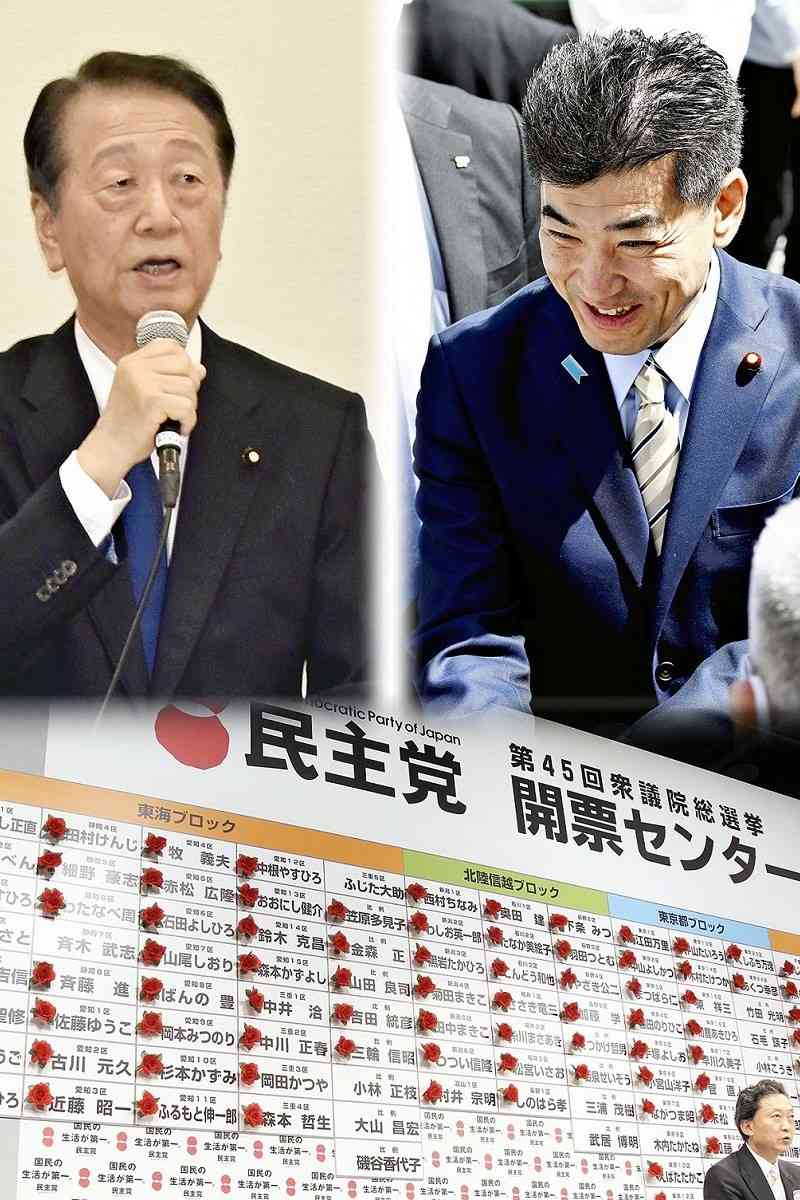Japan By-Election Shock / Discontent Swirls Around Izumi Leadership as CDPJ Tailwind Lacks Power

15:52 JST, May 2, 2024
Losing all three seats on offer in Sunday’s House of Representatives by-elections was a serious blow to the ruling Liberal Democratic Party. This third and final installment in a series explores issues surrounding the main opposition Constitutional Democratic Party of Japan after its victories in these by-elections.
***
CDPJ chief Kenta Izumi grinned from ear to ear as he basked in the adulation being lobbed his way by participants in a May Day event held in Sapporo on Wednesday.
“Congratulations on your three wins,” said one participant, referring to the CDPJ’s sweep of the lower house by-elections. While savoring the moment, Izumi indicated he is determined to keep the ball rolling.
“I think this is just a stepping stone,” Izumi said at the event. “We’ll keep plugging away with our colleagues across the nation.”
Even before the by-elections, Izumi had sensed the wind was starting to blow at the CDPJ’s back in the wake of political fund scandals that had embroiled several LDP factions.
A survey conducted quietly in March on the prospects for the next lower house election had indicated that the CDPJ could more than double its number of seats in single-seat constituencies from 58 to about 120. When combined with the seats the party could win in the proportional representation section, the CDPJ was on track on achieve Izumi’s goals of his party winning 150 seats and the ruling parties losing their majority in the chamber.
Given these survey results, CPDJ Secretary General Katsuya Okada issued instructions to speed up efforts to field more candidates in the proportional representation section. This stemmed from his experience in the 2009 lower house election, when the then Democratic Party of Japan swept to power. In that election, the DPJ did not have enough candidates listed for the Kinki proportional representation block, and two seats were instead reallocated to other parties.
‘Major political situation’
Izumi believes that submitting a no-confidence motion against Prime Minister Fumio Kishida’s Cabinet in the second half of the current Diet session could become his party’s biggest weapon.
On Sunday evening, CDPJ Diet Affairs Committee Chairperson Jun Azumi pored over the by-election results. “The public criticism of the LDP is staggering,” Azumi said to a close aide. “Submitting a no-confidence motion could create a major political situation.”
The CDPJ plan revolves around the ruling parties’ recent proposal to amend the Political Funds Control Law. The CDPJ expects that if it opposes this proposal as lukewarm and submits a no-confidence motion, some LDP members who have been critical of Kishida might throw their support behind the motion.
In 1993, during the administration of then Prime Minister Kiichi Miyazawa, senior LDP leaders gave up on passing a bill on political reforms centering on electoral system reform after they failed to consolidate support for the plan. A no-confidence motion submitted by the opposition parties was passed due to a rebellion by then powerful LDP figures, including Ichiro Ozawa.
SUBHEAD: Debate over leadership change
Despite the recent developments, a CDPJ member who previously served as a cabinet minister refused to get carried away.
“I don’t feel any of the excitement that was tangible the days before the DPJ took over the reins of government. At the moment, it feels like it’s just a gentle breeze blowing,” the CDPJ member said.
In a nationwide opinion survey conducted by The Yomiuri Shimbun immediately before the 2009 lower house election, 32.2% of respondents said they supported the DPJ. This was comfortably more than the 26.7% who said they backed the LDP. But in a similar survey conducted in April this year, support for the CDPJ was barely 5%, far below the 24% of respondents who favored the LDP.
Sunday’s by-election victories were the first in either Diet chamber by the CDPJ under Izumi’s leadership. Even some members of Izumi’s own party strongly believe he should be replaced because of a perceived lack of ability.
Izumi’s tenure as party head will expire in September. Some members have encouraged former Prime Minister Yoshihiko Noda and former CDPJ leader Yukio Edano to throw their hats in the ring. Midranking lower house lawmaker Kazuhiko Shigetoku also has indicated a willingness to join the leadership race.
Ozawa is now a CDPJ member of the lower house. At a meeting of his own political group on April 23, Ozawa took a veiled swipe at Izumi. “In order to bring about a change of government, we must have a leadership group that can bring the opposition parties together,” Ozawa said.
Realistic approach
Ozawa is paying particular attention to cooperation with the Japanese Communist Party, which can be expected to receive a certain number of loyal votes in each constituency. The JCP contributed to the CDPJ’s three triumphs in the latest by-elections by opting not to field candidates, including in the race for the No. 1 constituency in Shimane Prefecture, which was the only direct battle between opposition and ruling bloc candidates.
However, the CDPJ and the JCP share little on basic policies on issues such as the Constitution, foreign policy and security. Building a closer relationship will not be easy if the CDPJ aims to gain supports from voters across the political spectrum, such as moderate conservatives and those with no party affiliation.
“We must make a realistic policy decision,” CDPJ Policy Research Committee Chairperson Akira Nagatsuma said at a meeting with Japanese Trade Union Confederation (Rengo) officials at the Diet on March 6. Nagatsuma announced his party intended to support a bill establishing a government-approved “security clearance system” through which authorized individuals would beallowed to access sensitive information in the economic security field.
There had been some reluctance to support the bill, but Nagatsuma apparently pushed ahead with the move to distinguish CDPJ from the JCP and other parties that opposed the legislation. Despite this, concerns remain within the CDPJ over the party’s approach.
“Unless we change the current situation in which we rely on the JCPs’ cooperation in elections, people will doubt whether we have the ability to manage an administration perceived as the CDPJ being deendent on the JCP,” a CDPJ member said.
This series was written by Michitaka Kaiya, Chie Morifuji, Masashi Nakata and Takeo Maeda.
Top Articles in Politics
-

Japan PM Takaichi’s Cabinet Resigns en Masse
-

Sanae Takaichi Elected Prime Minister of Japan; Keeps All Cabinet Appointees from Previous Term
-

Japan’s Govt to Submit Road Map for Growth Strategy in March, PM Takaichi to Announce in Upcoming Policy Speech
-

LDP Wins Historic Landslide Victory
-

LDP Wins Landslide Victory, Secures Single-party Majority; Ruling Coalition with JIP Poised to Secure Over 300 seats (UPDATE 1)
JN ACCESS RANKING
-

Producer Behind Pop Group XG Arrested for Cocaine Possession
-

Japan PM Takaichi’s Cabinet Resigns en Masse
-

Man Infected with Measles Reportedly Dined at Restaurant in Tokyo Station
-

Israeli Ambassador to Japan Speaks about Japan’s Role in the Reconstruction of Gaza
-

Videos Plagiarized, Reposted with False Subtitles Claiming ‘Ryukyu Belongs to China’; Anti-China False Information Also Posted in Japan
























